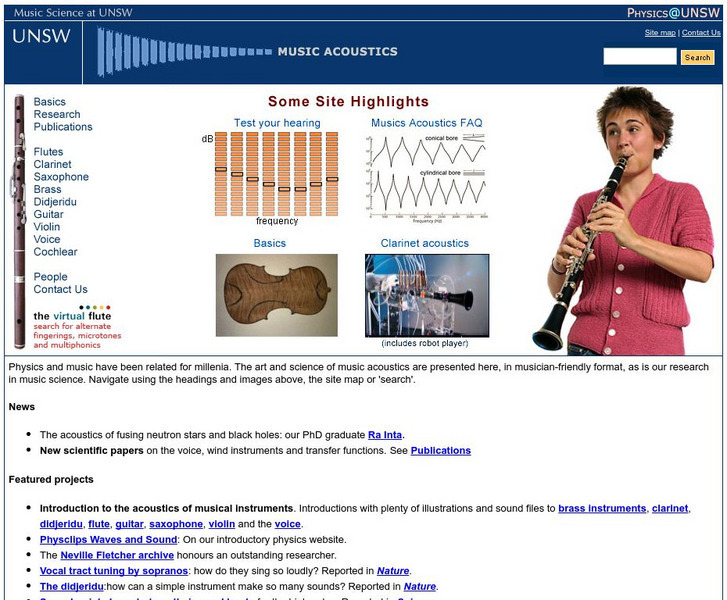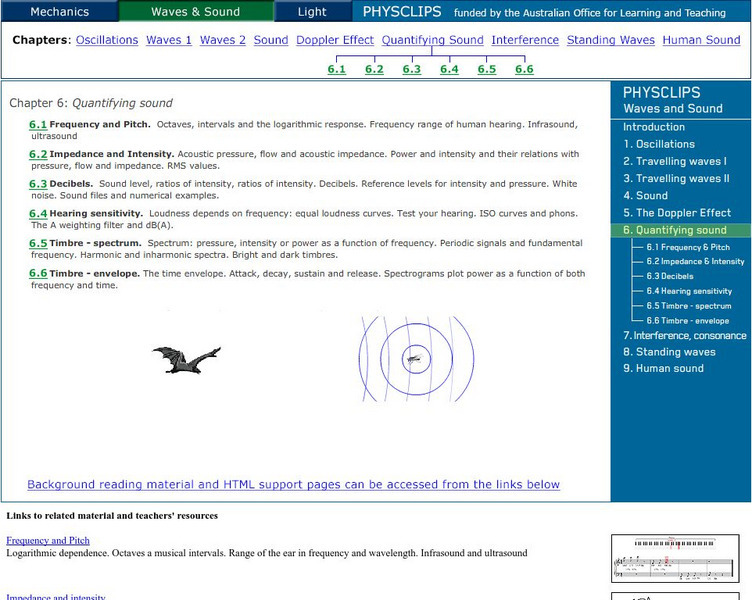Hi, what do you want to do?
Georgia Department of Education
Ga Virtual Learning: Sound
Through multiple animations and interactive activities, this module allows students to investigate the properties of sound.
Physics Hypertextbook
The Physics Hypertextbook: The Nature of Sound
Study the details of sound from characteristics to speed, ultrasound, infrasound, and other aspects of sound waves.
University of Colorado
University of Colorado: Physics 2000: Constructive and Destructive Wave Interference
A physics course web page that features a Java applet in which visitors can observe the waveform resulting from the interference of two waves. The amplitude and wavelength of the interfering waves can be altered and the outcome observed.
University of New South Wales (Australia)
University of New South Wales: Introduction to Acoustics of Brass Instruments
Discover the acoustical properties of brass instruments from this well researched site provided by the University of New South Wales. Everything from lip control to bell shape is discussed as it applies to frequencies and harmonics.
University of New South Wales (Australia)
University of New South Wales: Introduction to Saxophone Acoustics
Learn all about the ways a saxophone produces sound. Discover why the reed, playing softly or loudly and tone holes play important roles in this instruments acoustics.
University of New South Wales (Australia)
University of New South Wales: Music Acoustics
Learn about the science of music acoustics. Topics such as how do violins change with age and brass acoustics are explored through scientific research.
Physics Classroom
The Physics Classroom: Sound Waves and Music: The Doppler Effect and Shock Waves
This physics tutorial focuses on the application of the Doppler effect to sound.
CK-12 Foundation
Ck 12: Physical Science: Sound Waves
[Free Registration/Login may be required to access all resource tools.] Definition of sound, what sound waves are, how they are generated and what media they can travel through.
Georgia State University
Georgia State University: Hyper Physics: Architecture for Acoustics
A physics tutorial on designing an auditorium and solving the problem of sound reflection. Illustrated.
Georgia State University
Georgia State University: Hyper Physics: Water Tube Resonance Experiment
Online physics lab experiment in which students use resonating waves inside of a closed-end air column to determine the speed of sound. The form allows students to check their answers and receive immediate feedback.
Physics Classroom
The Physics Classroom: Sound Waves and Music: Resonance
The focus of this physics tutorial is on the application of mathematical relationships and standing wave concepts to musical instruments in three general categories of instruments: instruments with vibrating strings, open-end air column...
Physics Classroom
The Physics Classroom: Sound Waves and Music: Guitar Strings
A guitar string has a number of frequencies at which it will naturally vibrate. These natural frequencies are known as the harmonics of the guitar string. Students work through several example problems.
Physics Aviary
Physics Aviary: Speed of Sound Lab
This lab is designed to have students investigate the relationship between the distance from an explosion and the time it takes the sound of the explosion to reach the observer. The temperature of the air can be changed by changing the...
Physics Classroom
The Physics Classroom: Sound Waves and Music: Standing Wave Patterns
Elaborate on the essential characteristics and the causes of standing wave patterns and relate these patterns to the vibrations of musical instruments.
Ducksters
Ducksters: Physics for Kids: Basics of Sound
Kids learn the basics of the science of sound, the speed of sound, and volume. What is sound and how does it move? It is a wave made from the vibration of molecules.
Physics Classroom
The Physics Classroom: Sound Properties and Their Perception
The concept of pitch and frequency is covered in this tutorial. Learn what frequency and pitch are, the difference between infra sound and ultrasonic frequencies, and how pitch is related to the frequency of a sound.
Physics Classroom
The Physics Classroom: Sound Wave and Music Table of Contents
Learners investigate the nature of a sound wave, sound properties, resonance, musical instruments, and standing waves. The tutorial consists of lessons and problems to check for understanding.
Colorado State University
Little Shop of Physics: The Amazing Physics of Everyday Objects
Try out these experiments you can do with items you might already have around the house: "Two Ball Bounce," "Cartesian Diver," "Straw Flute," "Bernoulli Ball," and others. Two experiments, "Imploding Pop Can" and "Balloon in a Bottle,"...
University of New South Wales (Australia)
University of New South Wales: School of Physics: Physclips: Interference
Physiclips thoroughly presents the concept of interference with animations and film clips. Learn about linear superposition, beats, and consonance in this learning module.
Georgia State University
Georgia State University: Hyper Physics: Sound Propagation
This page and the many pages which are indexed to focus on the behaviors of sound which characterize it as a wave. Reflection, refraction, interference, diffraction and more are clearly illustrated and explained.
University of New South Wales (Australia)
University of New South Wales: School of Physics: Physiclips
Concepts of waves and sound are thoroughly presented in animation and film clips.
University of New South Wales (Australia)
University of New South Wales: School of Physics: Physclips: Quantifying Sound
Learn about terms to quantify sound like pitch, frequency, decibels, and much more in this learning module. Learning module includes animations and videos.
University of Florida
Florida Museum of Natural History: Physical Science
This guide focuses on four physical science topics that fascinate children and scientists alike. They are motion, magnets, sound, and light. With your guidance and support, these topics provide children with many opportunities to explore...
CK-12 Foundation
Ck 12: Forms of Energy
[Free Registration/Login may be required to access all resource tools.] In this online lesson students will investigate examples of kinetic and potential energy and their transformations.




















